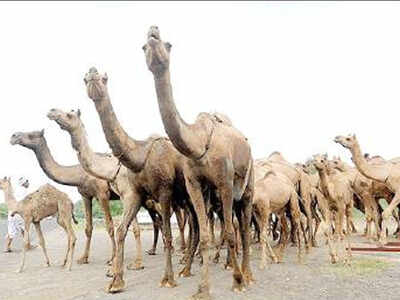
JAISALMER: Cruelty against camel, the state animal of Rajasthan, seems to be at its peak. Yet another incident of a camel being killed came to light on Thursday, when an unidentified vehicle hit the animal near Bhaniyana Devikot area here.
Degrai Camel Conservation institute president Sumer Singh Bhati, who reached the spot where the accident occurred said, “Incidents of cruelty against camels is on the rise. Police and administration should take strict action against the culprits to prevent such instances in future.”
The incident comes just five days after a four-year-old camel was axed to death in Churu district. The attack occurred after the abandoned camel allegedly rampaged through a standing crop, causing loss to the farmer. With many areas experiencing agrarian distress, farmers are under financial stress and thus it is difficult for them to look after their livestock. In such a scenario, many camels are abandoned as their utility has also decreased.
Ramkaran Raika, who owns a camel says, “The per-day expense to feed a camel is approximately Rs 350-Rs 400. As camel trade is disrupted, camel breeders were forced to set male camels free. This has led to an increase in cruelty cases,” The 20th Livestock Census in 2019 revealed that camel population has drastically declined in the state.
In 2012, the figure was 3.26 lakh, which has declined to just 2.13 lakh as of 2019. Bhati said, the state government declared it as the state animal but no special efforts have been made to protect them. The schemes that were announced for camel conservation were also withdrawn.
“Cattle herders are not getting any amount under the National camel development scheme and new registration in this scheme is still closed due to which number of camels is continuously declining and camel smuggling is continuing unabated, due to which camels are on the verge of extinction,” added Bhati.
Herders claim that status of state animal came with many restrictions as the state government went on to pass a law banning the slaughter, trade and unauthorised transportation of camels. Moreover, tourism has also been hit, where there was some utility of the animal. “This protocol of state animal has affected business and sales have declined. The animals are not allowed to be sold outside the state, except for agricultural purposes. It has no utility and keeping it makes no sense. This is why many herders abandon old and male camels,” said Shankar Singh, another herder.
The animal, which is dubbed as the ‘ship of the desert’ and considered a lifeline for desert dwellers, is now often categorised as vermin (wild animals considered harmful) and attacked by the villagers on a daily basis, after they are abandoned to their fate.
Degrai Camel Conservation institute president Sumer Singh Bhati, who reached the spot where the accident occurred said, “Incidents of cruelty against camels is on the rise. Police and administration should take strict action against the culprits to prevent such instances in future.”
The incident comes just five days after a four-year-old camel was axed to death in Churu district. The attack occurred after the abandoned camel allegedly rampaged through a standing crop, causing loss to the farmer. With many areas experiencing agrarian distress, farmers are under financial stress and thus it is difficult for them to look after their livestock. In such a scenario, many camels are abandoned as their utility has also decreased.
Ramkaran Raika, who owns a camel says, “The per-day expense to feed a camel is approximately Rs 350-Rs 400. As camel trade is disrupted, camel breeders were forced to set male camels free. This has led to an increase in cruelty cases,” The 20th Livestock Census in 2019 revealed that camel population has drastically declined in the state.
In 2012, the figure was 3.26 lakh, which has declined to just 2.13 lakh as of 2019. Bhati said, the state government declared it as the state animal but no special efforts have been made to protect them. The schemes that were announced for camel conservation were also withdrawn.
“Cattle herders are not getting any amount under the National camel development scheme and new registration in this scheme is still closed due to which number of camels is continuously declining and camel smuggling is continuing unabated, due to which camels are on the verge of extinction,” added Bhati.
Herders claim that status of state animal came with many restrictions as the state government went on to pass a law banning the slaughter, trade and unauthorised transportation of camels. Moreover, tourism has also been hit, where there was some utility of the animal. “This protocol of state animal has affected business and sales have declined. The animals are not allowed to be sold outside the state, except for agricultural purposes. It has no utility and keeping it makes no sense. This is why many herders abandon old and male camels,” said Shankar Singh, another herder.
The animal, which is dubbed as the ‘ship of the desert’ and considered a lifeline for desert dwellers, is now often categorised as vermin (wild animals considered harmful) and attacked by the villagers on a daily basis, after they are abandoned to their fate.

Coronavirus outbreak
Trending Topics
LATEST VIDEOS
City
 Shocking: Youth thrashed, made to drink urine over ‘illicit affair’ in Rajasthan's Barmer
Shocking: Youth thrashed, made to drink urine over ‘illicit affair’ in Rajasthan's Barmer  Unlock 3: Hotels to open August 1, gyms decision next week in Delhi
Unlock 3: Hotels to open August 1, gyms decision next week in Delhi  Rajasthan resort politics: Gehlot camp MLAs to be shifted to another hotel in Jaisalmer
Rajasthan resort politics: Gehlot camp MLAs to be shifted to another hotel in Jaisalmer  Herd immunity cannot be a strategic choice or option for India, says Centre
Herd immunity cannot be a strategic choice or option for India, says Centre
More from TOI
Navbharat Times
Featured Today in Travel
Quick Links
Kerala Coronavirus Helpline NumberHaryana Coronavirus Helpline NumberUP Coronavirus Helpline NumberBareilly NewsBhopal NewsCoronavirus in DelhiCoronavirus in HyderabadCoronavirus in IndiaCoronavirus symptomsCoronavirusRajasthan Coronavirus Helpline NumberAditya ThackerayShiv SenaFire in MumbaiAP Coronavirus Helpline NumberArvind KejriwalJammu Kashmir Coronavirus Helpline NumberSrinagar encounter
Get the app




